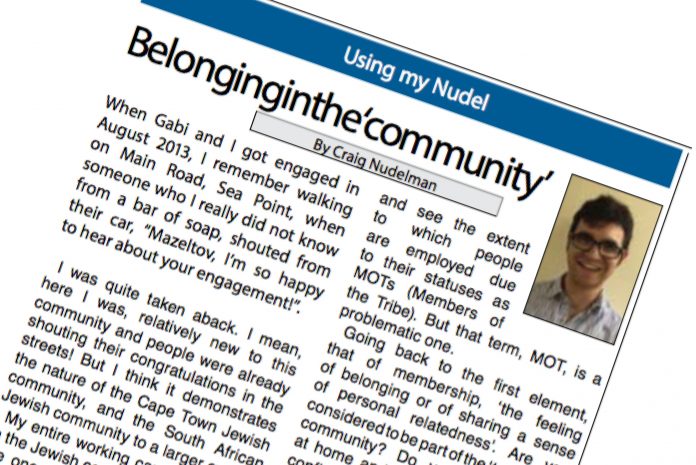Using my Nudel
By Craig Nudelman
When Gabi and I got engaged in August 2013, I remember walking on Main Road, Sea Point, when someone who I really did not know from a bar of soap, shouted from their car, “Mazeltov, I’m so happy to hear about your engagement!”.
I was quite taken aback. I mean, here I was, relatively new to this community and people were already shouting their congratulations in the streets! But I think it demonstrates the nature of the Cape Town Jewish community, and the South African Jewish community to a larger extent.
My entire working career has been in the Jewish community. Besides for the one time I stepped out to work in a mostly Jewish-owned start-up, it’s been quite a communally driven ride. From ChaiFM up in Jo’burg to the Cape Board of Deputies, and now my current teaching career at Herzlia, as well as the various shul choirs I’ve sung in, the community has been my employer. But the term ‘the community’ is so vague, with so many different aspects within it. What does ‘the community’ mean today?
David McMillan and David Chavis say that there are four elements that make up a community. The first one is membership, which is ‘the feeling of belonging or of sharing a sense of personal relatedness’. Then there is influence, ‘a sense of mattering, of making a difference to a group and of the group mattering to its members’. Reinforcement is the third, ‘an integration and fulfilment of needs. This is the feeling that members’ needs will be met by the resources received through their membership in the group.’ The last element is ‘shared emotional connection, the commitment and belief that members have shared and will share history, common places, time together, and similar experiences.’
Let’s talk about the last one first. We really have a shared history and memory. Our (mostly) Litvak background, with a dollop of British influence here and there, has created who we are today, and I believe that there is a commitment to continue to share our history, time and experiences together as the ‘community’.
Let’s then go to the third element, that of ‘reinforcement’. With so many organisations ensuring that those who identify with the community’s needs will be met, this certainly isn’t a problem. With Jewish Community Services, Astra, and Staffwise, bursaries from the Cape Board and financial assistance from Herzlia, among many others, our community is definitely supportive. This doesn’t even touch on those who get jobs through community networking. We can look at many businesses today and see the extent to which people are employed due to their statuses as MOTs (Members of the Tribe). But that term, MOT, is a problematic one.
Going back to the first element, that of membership, ‘the feeling of belonging or of sharing a sense of personal relatedness’. Are you considered to be part of the ‘traditional’ community? Do you find yourself at home and comfortable within the confines of the Orthodox and Zionist Jew? One can further unpack those terms.
What is Orthodoxy in South Africa today? Is it driving to Shul on Friday night, having a Shabbas dinner with the family and then going to the rugby at Newlands on the Saturday evening after watching some soccer on TV? And who is a Zionist? Can I believe in a two-state solution, and prefer the ideological tenets of Labour rather than Likud? Can I bad-mouth Prime Minister Netanyahu’s policies on settlements and still be a good Zionist? Does that negate my membership within the tribe? It is such a loaded term in our ‘community’.
Now let’s go to the second element — influence: ‘the feeling of belonging or of sharing a sense of personal relatedness.’ McMillan and Chavis see this as a contradictory term. One the one hand, one must assert one’s influence on one’s group. One the other hand, ‘cohesiveness is contingent on a group’s ability to influence its members’. They ask the question, “Is it a bad thing for a group to exert influence on its members to attain conformity?”. To answer YES! to that, we can turn to the ANC. We can categorically state that through conforming to the will of the top echelons of the ruling party, its members have allowed Jacob Zuma to loot South Africa’s coffers for his and his cronies (and the Guptas) personal benefits. But, conformity can lead to revolutionary concepts and ideas.
I think that this community is an amazing body to be a part of. It is caring, loving and generous. It is a community filled with people who embody menschlikheid, people who shout ‘Mazeltov’ on the street after hearing about someone’s simcha. It has its flaws and we can always question what kind of community we are. However, I hope that through our differences and questions we can dictate what kind of community we would like to be, and think about our collective future.
A community in which I can proudly raise my daughter.
Craig Nudelman is a teacher, a father and a Jewish observer











